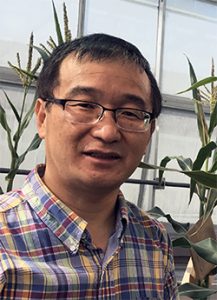Genetics & Breeding

Sep. 9, 2018
Mariola Usovsky
Mariola is a passionate molecular soybean breeder and scientist with over 10 years of public soybean breeding experience. She is highly involved in the soybean breeding pipeline and release of many soybean cultivars. Her expertise includes introgression of traits that involve high oleic and low linolenic genes for improving soybean fatty acid composition, protein genes for increasing seed protein content, soybean cyst nematode resistance genes, and genes with tolerance to Liberty® and Enlist® herbicides. She works towards optimizing plant breeding schemes to help reduce costs and time. Moreover, Mariola develops strategic directions, goals, and plans for molecular research, and provides…

Aug. 22, 2018
Wenping Qiu
Molecular interactions between grapevine and obligate biotrophic Uncinula necator Powdery mildew caused by the fungus Uncinula necator is the most destructive fungal disease in grapevines worldwide. U. necator thrives only on living grapevine tissues by getting nutrients through an elaborate feeding structure haustoria formed between fungus and epidermal cell. Research in the Qiu laboratory focuses on understanding molecular mechanisms underlying this intimate relationship between grapevine and U. necator. The lab conducts high throughput discovery and hypothesis-based research projects hopefully, to reveal key steps in the complex interactions that happen after fungal conidiospores start to germinate on the surfaces of leaf, stem…

Aug. 21, 2018
Bing Yang
Bing’s group has used rice as a workhorse to develop genome editing technologies and demonstrate their promising potential as biotech tools for basic and applied research in rice and other crop plants. With the increasingly available sequences of many plant genomes, technologies for genome editing have become the most promising and popular tools for scientists to understand such complex genomes and precisely and quickly manipulate them for good. Genome editing technologies allow precise, targeted genomic changes. TALENs and CRISPR/Cas represent the state-of-the-art genome editing technologies and hold immense promise for defining the genetic and molecular basis for valuable traits, as…

July 30, 2018
Perry Gustafson
Educational background Ph.D., Genetics, University of California, Davis M.S., Agronomy, Colorado State University B.S., Crop Science, Colorado State University…

July 30, 2018
Jason Gillman
Educational background Ph.D., Plant Molecular Biology, Cornell University B.S., Botany, Colorado State University…

July 30, 2018
Sherry Flint-Garcia
My lab is interested in several aspects of genetic diversity in maize. Artificial selection has impacted maize diversity during its domestication from teosinte (Zea mays ssp. parviglumis) to landrace varieties, and during plant breeding from landrace varieties to modern inbred lines. One specific research project is examining the impact of artificial selection on protein and amino acid composition of maize kernels. A more broad interest is diversifying the genetic base of maize by utilizing landraces and teosinte, the ancestor of maize. Educational background Ph.D., Genetic Area Program, University of Missouri B.S., Biology, Saint Mary’s University of Minnesota…

Feb. 27, 2018
Kerry Clark
Kerry Clark was a soybean breeder from 1993-2012 and continues to work on the Feed the Future Soybean Innovation Lab, which is trying to improve soybean yields and production across sub-Saharan Africa. She runs a mechanization development and fabrication training team that includes three equipment designers from Ghana. This team has trained over 200 manufacturers in 12 African countries and has helped build service provision businesses so that small-holder farmers can have access to modern farming methods. Clark is also part of a multi-state collaboration working to improve available cover crop varieties for U.S. farmers. She teaches soil pedology, genesis,…

Jan. 10, 2018
Gary Stacey
Gary Stacey is Curators’ Distinguished Professor and Professor of Plant Science and Technology at the University of Missouri-Columbia. His research focuses generally on molecular aspects of plant-microbe interactions, including studies of the beneficial legume-rhizobium symbiosis and plant-fungal pathogen interactions. He has also been instrumental in the development of genomic resources for the study of soybean. He has mentored 51 postdoctoral fellows and 36 Ph.D. and 8 M.S. graduate students. Past postdocs have gone on to start independent careers in academia (e.g., Michigan State Univ., Washington State Univ.), industry, as well as winning the 2005 USA National Medal of Technology, which…

Jan. 10, 2018
Andrew Scaboo
Educational background Ph.D., University of Arkansas, 2010…

Jan. 9, 2018
Walter Gassmann
Gassmann received his Ph.D. from UC San Diego in 1996 researching plant membrane transporters in the lab of Dr. Julian Schroeder. As a post-doctoral researcher in the lab of Dr. Brian Staskawicz, UC Berkeley, he cloned and characterized RPS4, one of the founding members of the Toll/Interleukin-1 Receptor – Nucleotide Binding Site – Leucine-Rich Repeat (TNL) class of plant innate immune receptors, that recognizes the presence of the bacterial effector protein AvrRps4. His lab at MU, which he started as an assistant professor in the Department of Plant Microbiology & Pathology in 2000, cloned the second antibacterial receptor of the…
- « Previous
- 1
- 2
- 3
- Next »